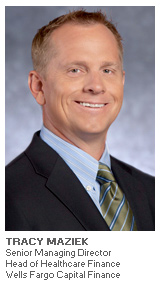
ABL Advisor recently "took the pulse," so to speak, of the healthcare finance marketplace. We turned to Tracy Maziek, Senior Managing Director at Wells Fargo Healthcare Finance to better understand the effects of, among other things, the implementation of the Affordable Healthcare Act and the characteristics common to successful healthcare providers.
With 20-plus years in the healthcare finance industry, Maziek has spent the greater part of his career at independent commercial finance companies such as FINOVA Capital, Siemens Financial Services and Oxford Finance. Maziek joined Wells Fargo Capital Finance in 2012 to help spearhead their efforts in healthcare lending.
ABL Advisor: Please share your thoughts on the overall dynamics of the healthcare finance market in 2014. Was the marketplace as active, more active or less active as compared to 2013 and why?
Tracy Maziek: In comparing the healthcare finance market year-over-year, I would certainly characterize 2014 as more active than 2013. From our perspective at Wells Fargo Capital Finance, this could be a function of our presence in the space and the marketplace recognizing that we are making a strong effort in terms of our healthcare lending platform.

With regard to the dynamics within the industry, it may sound a bit cliché but I think this holds true: the only constant in healthcare is change. There were things happening in the market, such as interest rates remaining extremely low that proved to be favorable. There have also been continued regulatory reimbursement changes which affected certain areas such as durable medical equipment providers. Margins have decreased in the sector. This makes borrowers less likely candidates for cash-flow loans and more likely candidates for asset-based loans. This dynamic in particular led to a number of opportunities on the asset-based lending side of our business.
I would also add that in 2014 there was greater certainty or reduced uncertainty – you can decide which – with the effect of the Affordable Healthcare Act (ACA). I think that has helped increase the deal activity in the healthcare finance marketplace.
ABL Advisor: What types of financings from the standpoint of the uses of funds were more prevalent in the healthcare finance landscape in 2014?
Maziek: When I look at where our funds were deployed in 2014, on a very rough basis, the deals have been split in thirds between refinancings; growth capital for organic growth or small company acquisitions; and more transformative M&A financings. M&A financings probably had the slight advantage.
ABL Advisor: As we are one year into the implementation of the Affordable Healthcare Act, is there more to add with regard to the way the Act has impacted the healthcare finance marketplace?
Maziek: The short answer is yes, the implementation of the Act has affected healthcare lending, even if only tangentially. With additional clarity around the ACA, some borrowers appear to have been re-energized to either grow or acquire companies.
ABL Advisor: Have you seen hospitals and other healthcare providers migrate away from their bankers who may have been generalists in recent times to lenders who are specialists in healthcare finance?
Maziek: Again, the short answer is yes. Bankers and private equity firms often express concern over what some call “stroke of the pen” risk within healthcare. By that, they refer to the fact that companies or entire sectors can be altered (sometimes dramatically) by a member or group of members in Congress passing reimbursement or regulatory legislation. I think healthcare providers are beginning to take the same approach when it comes to their lenders. I’ve heard on several occasions borrowers growing tired of banks changing strategy within healthcare based solely on a input (or whims) of someone within the bank’s chain of command reading this headline or other news commentary without in depth knowledge of the topic. Sometimes these changes are even Draconian with regard to their healthcare portfolio. Several of our clients chose to work with us because of our focus on the healthcare lending space.
ABL Advisor: In citing healthcare bankruptcies, one source – Becker’s Hospital CFO – noted that 2014 was a decisive year for troubled healthcare companies. While the circumstances often differ from situation to situation, are there any characteristics you can share with your readers that are common to the most successful healthcare providers? On the flip side, are there any operational pitfalls common to those providers who may be struggling to survive?
Continued on Page 2...